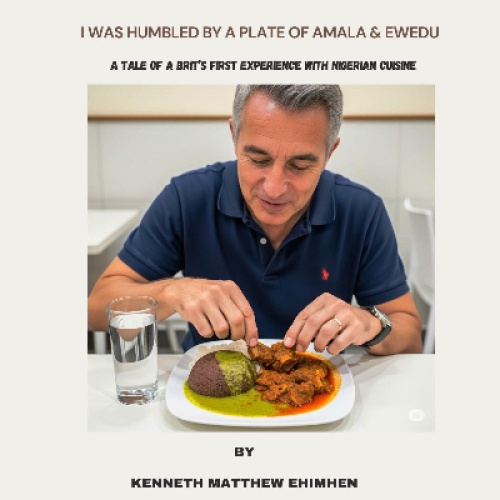stepped into Mama T's Kitchen, a bustling
local restaurant tucked away in a vibrant
corner of Ikeja. The aroma of spices and
simmering stews hit me immediately, a
heady mix of unfamiliar scents that
promised adventure. As a Briton on my first
trip to Nigeria, I was eager to dive into the
culture, and what better way than through
food? I'd heard whispers about amala and
ewedu, a Yoruba delicacy, and decided
today was the day to try it.
The waiter, a cheerful man with a wide grin,
recommended amala with ewedu soup
and a well stewed goat meat. "It's the real
Yoruba experience," he said, his eyes
twinkling. I nodded enthusiastically, my
stomach rumbling in anticipation. The plate
arrived swiftly - a dark, smooth mound of
amala, a glossy green ewedu soup, and a
vibrant red stew dotted with chunks of
meat. It looked exotic, inviting, like a
culinary postcard from the heart of Yoruba
land. I scooped a small ball of amala with
my fingers, as instructed, dipped it into the
ewedu, and swirled it through the stew. The
first bite was a revelation - earthy, slightly
sour amala, silky ewedu with its subtle
bitterness, and the fiery kick of the stew. I
smiled, feeling like I'd unlocked a secret of
Nigerian cuisine.
But then, the heat began to build. A slow
burn at first, creeping up my throat. My
British palate, accustomed to milder flavors
like shepherd's pie and fish and chips, was
unprepared for the stew's peppery assault. I
took another bite, determined to push
through, but the spice intensified, a
relentless wave that left my tongue tingling
and my eyes watering. I reached for my
glass of water, but it was lukewarm, offering
no relief. The waiter noticed my distress and
slid a small bowl of palm oil across the table.
"Try this, it helps," he said kindly.
Desperate, I dipped my fingers into the oily
liquid and took another bite of amala,
hoping for salvation. Instead, the oil
amplified the heat, coating my mouth with
a slick, fiery residue that seemed to cling to
every taste bud. My stomach churned, a
warning sign I ignored as I tried to smile
through the discomfort, not wanting to
offend. Then came the goat meat. I bit into
a piece, expecting tender succulence, but
my teeth met something hard - a small
bone fragment that crunched unpleasantly.
I froze, my mouth now a chaotic battlefield
of spice, oil, and an unexpected texture.
Swallowing became a Herculean task. I
coughed, drawing curious glances from
nearby diners, their plates piled high with
amala like seasoned pros.
At this point, my confidence waned,
replaced by a growing sense of dread. The
final blow came minutes later. My stomach,
overwhelmed by the unfamiliar
combination of yam flour, pepper, and oil,
staged a full rebellion. A sharp cramp
twisted through my gut, and a wave of
nausea hit me like a Lagos traffic jam -
sudden and inescapable. I excused myself,
stumbling toward the restroom, praying I'd
make it in time. The facilities, to my horror,
were less than pristine, and the lack of tissue
paper turned a bad situation into a
nightmare. I emerged, pale and sweaty, my
enthusiasm for culinary exploration in tatters.
Back at the table, the waiter looked
concerned. "Not your taste, sir?" he asked
gently. I managed a weak smile, muttering
something about jet lag, too embarrassed
to admit my defeat. I paid the bill, left a
generous tip out of guilt, and shuffled back
to my hotel, vowing to stick to jollof rice for
the rest of my trip. As I lay on my bed,
nursing a bottle of chilled water and a
bruised ego, I realized Nigeria's vibrant food
culture was a force to be respected. amala
and ewedu had won this round, leaving me
with a story I'd laugh about later - but not
today.
Today, I was a Briton humbled by a plate of
Yoruba soul food, dreaming of bland toast
and a quieter stomach.




